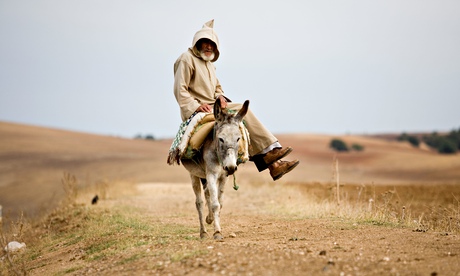
The village doesn’t appear on any map. A few squat adobe houses scattered up a switchback dirt track, terraces of vegetables and fruit trees rising from the dry river bed, a small fountain where the locals fill their water containers, and that’s about it. Smells are of straw and tagine spices. Berber women in hijabs and wide-brimmed hats herd goats on the higher slopes. Contact with the outside world comes twice a week, when the cousins cram into a rusty van and jolt down from north Morocco’s Rif mountains to sell barrels of plums and potatoes in the nearest town.
They’re all cousins here. The village patriarch they call el jefe (the boss) is usually seen riding his donkey around the mountainside in djellaba and trilby, chain-smoking and roaring greetings in the Berber tongue, Tamazight. El jefe has 15 children, and they now have families of their own, all needing new houses as the old are outgrown.
I am supposedly here to help build one of these houses. Unfortunately, the intended construction site is on a 15-degree slope that needs to be levelled by hand before foundations can be laid. Omar, project visionary, insists this will take two days, and continues to insist this throughout my two-week stay. With Workaway (the volunteer site I’d organised my trip through), you have to learn to be adjustable.
Further factors slow progress. First, as it is Ramadan, digging must be done at night. Second, Omar’s interest in building is far surpassed by his interest in music and revolution. And with such a limited population, his diggers, musicians and revolutionaries must all be drawn from the pool of cousins. Multitasking is required.
As the call to prayer fades into the evening’s chorus of crickets, we sit under the emerging stars in the courtyard of el jefe’s house, breaking the daily fast with figs, harira soup and honey-soaked chebbakiya pastries. Omar lights a pipe and begins his favourite lecture on Abd el-Krim – 1920s guerrilla leader and president of the short-lived Rif republic. The Berbers, Omar insists, will rise up once again, this time against domination by the Moroccan state. The cousins mutter in Tamazight. Are they discussing revolution?
“No,” Omar admits, “mostly vegetable prices and women.”
As the moon rises, we troop down to the construction site. The cousins set to pickaxing the mountainside and carting away wheelbarrows of earth. We rotate jobs between digging and playing music.
Omar distributes instruments. The cousins’ enthusiasm makes up for their utter lack of musical ability. To an off-beat cacophony of percussion and the tuneless shrill of a recorder, we start to dance. Spades are dropped. As night wears on, a fire is stoked to grill sardines, or a freshly killed chicken. One night, Fuhad catches a wild hedgehog. A song is improvised, the only words of which I understand are inci (hedgehog) and tagine.
It may not be revolutionary, but Omar is thrilled.
“I think they’re getting better!” he exclaims. “And in two days the ground will be flat…”
• The trip was organised through workaway.info, an online resource listing nearly 10,000 volunteer placements worldwide. EasyJet flies to Marrakech from Bristol, Gatwick, Glasgow, Stansted, and Manchester from £48 return

